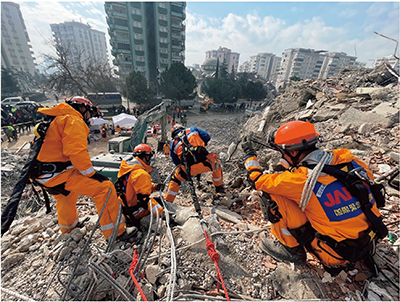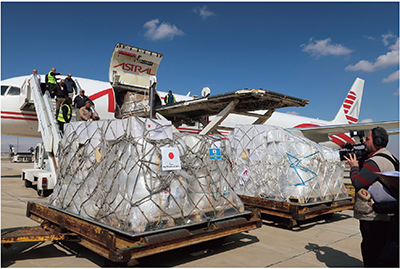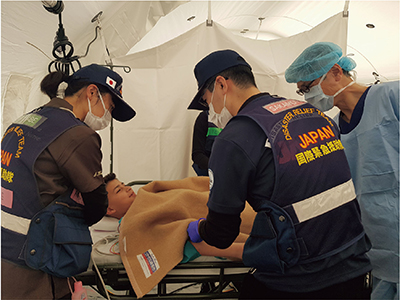(4) Humanitarian Assistance during Natural Disasters

Rescue teams working in the areas affected by the earthquake in Türkiye
(Photo: JICA)
In recent years, due in part to the impact of climate change, the frequency of short-term and localized abnormal torrential rainfall increases worldwide, and the damage caused by floods and landslides also tends to be more intense and frequent. Since developing countries have fragile economic and social infrastructures, many of them suffer great damage from disasters and require assistance from the international community.
In the event of a large-scale disaster overseas, Japan stands ready for the immediate provision of emergency assistance upon the request of the government of affected countries or international organizations. Japan offers several forms of assistance, such as the deployment of disaster relief personnel, in-kind assistance, and financial assistance. Japan provides either one or a combination of these forms of assistance considering the scale of the disaster and the request from the affected country or international organization.
● Japan’s Efforts

Emergency relief goods arriving at Damascus Airport (Syria)

Medical team performing pre-surgery procedures in the areas affected by
the earthquake in Türkiye (Photo: JICA)
There are five types of Japan Disaster Relief (JDR) teams that provide humanitarian assistance: (i) Urban Search and Rescue Team, (ii) Medical Team, (iii) Infectious Diseases Response Team, (iv) Expert Team (to provide technical advice or instructions on emergency disaster mitigation measures and recovery activities), and (v) Self-Defense Force Unit (to undertake medical activities and/or transportation of aid supplies and personnel when it is deemed particularly necessary). These teams are dispatched either individually or in combination.
Emergency relief goods are provided as in-kind assistance. Japan stockpiles, in three overseas warehouses managed by JICA, tents, blankets, and other supplies needed and to be provided for the affected people swiftly in the wake of a disaster.
As financial assistance, Japan provides Emergency Grant Aid to the governments of countries affected by natural disasters and/or conflict, and to international organizations that provide emergency assistance in affected areas for the purpose of providing relief to victims, refugees and displaced persons of natural disasters and conflicts overseas, and others.
In 2023, Japan supported emergency rescue operations in response to the earthquake that occurred in the southeastern part of Türkiye in February immediately after the disaster. While swiftly providing emergency relief goods to Türkiye and Syria through JICA, Japan dispatched rescue, medical, and expert teams to Türkiye to conduct search and rescue operations and provide medical assistance. Japan also inspected the condition of buildings and infrastructure damaged by the earthquake and provided technical advice on recovery and reconstruction. Additionally, Japan rapidly transported materials and equipment for the medical team to the site using a Japan Self-Defense Force aircraft, as well as approximately 89.5 tons of disaster relief supplies including tents located in Pakistan to Türkiye, in coordination and cooperation with the North Atlantic Treaty Organization (NATO). On top of that, Japan provides assistance for recovery and reconstruction in Türkiye by Emergency Grant Aid of 6 million US dollars through international organizations and 2.5 million US dollars through Japanese NGOs, as well as grant aid (5 billion yen), loans (80 billion yen), and technical cooperation, making use of Japan’s expertise (see “Stories from the Field 2” for Japan’s efforts on disaster risk reduction in Türkiye to date).
Furthermore, in March 2023, Japan dispatched the Japan Disaster Relief (JDR) Expert Team to respond to the oil spill disaster caused by a small tanker that capsized and sank off the coast of Mindoro Island in the central Philippines. In September, Japan provided Emergency Grant Aid in response to the earthquake disaster that struck the central region of Morocco and the flood disaster in the eastern part of Libya, and also provided emergency relief goods to nine countries.Note 51
Japanese NGOs also provide various forms of assistance to disaster victims utilizing ODA. They often work as a partner with international organizations and others in emergency relief activities. Japan Platform (JPF)Note 52 provides humanitarian assistance to refugees, displaced persons, people affected by conflicts and/or natural disasters, and others. The NGOs affiliated with JPF provide various forms of support to meet the local needs in regions where local government assistance is not readily available, such as Morocco (earthquake), Afghanistan (earthquake), Pakistan (flood), Ukraine (conflict), and other regions (see Part V, Section 1 (3)).
Disaster response is a common challenge for Japan and ASEAN countries, both of which are prone to natural disasters. Japan has supported the ASEAN Coordinating Centre for Humanitarian Assistance on disaster management (AHA Centre), which was established in 2011, and has contributed to strengthening its capacity. In 2023, Japan continued to support the establishment of the Disaster Emergency Logistic System for ASEAN (DELSA) to quickly transport emergency relief items to affected countries and the provision of assistance through this system. Japan also provided human resources development for the ASEAN-Emergency Response and Assessment Team (ASEAN-ERAT), which conducts emergency assessments of the damage, and for potential leaders of the National Disaster Management Organizations in ASEAN countries.
- Note 51: The nine countries are Afghanistan, Chile, Iran, Libya, Malawi, Mozambique, Syria, Türkiye, and Vanuatu.
- Note 52: See the glossary.
